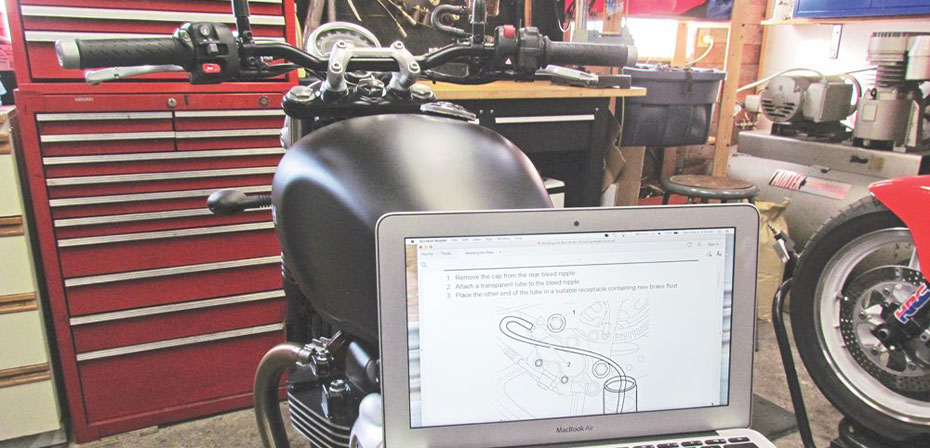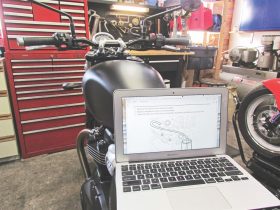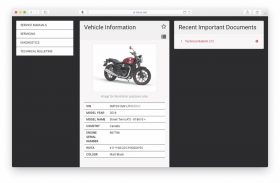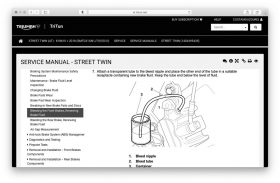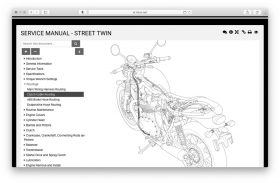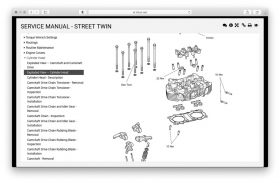Don’t judge a book by its cover (price). Something that seems expensive might make the most sense economically
As I wrote in the previous issue of Motorcycle Mojo, the recent acquisition of a 2018 Street Twin prompted me to search for a factory service manual, only to discover that Triumph offers neither a hard copy nor a digital manual for purchase. You can, however, access an online manual by purchasing blocks of time. Prices for this access can be staggering, ranging from US$7.50 for one hour to US$3,780 for one year – and that’s for access to a manual for a single model, not for Triumph’s entire range. Now, that last number is shocking, but it’s highly unlikely that anyone would need continuous access to a service manual for a full year to perform a repair, no matter how involved the procedure. And if they did, it might be time to ask someone more qualified to perform the job.
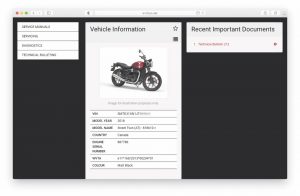 Instead, I opted for lifetime access to a Haynes online manual, which provides most of the information needed to perform service on the Street Twin. However, Haynes doesn’t cover everything, like bleeding the ABS system. This operation requires a factory diagnostic computer – available only to Triumph dealers – to operate the ABS module for servicing the brake fluid completely.
Instead, I opted for lifetime access to a Haynes online manual, which provides most of the information needed to perform service on the Street Twin. However, Haynes doesn’t cover everything, like bleeding the ABS system. This operation requires a factory diagnostic computer – available only to Triumph dealers – to operate the ABS module for servicing the brake fluid completely.
Triumph is about the only motorcycle manufacturer that doesn’t offer a service manual for outright purchase. Most manufacturers offer both printed and digital service manuals. Some of the latter are available online and some through the dealer network, with prices up to about $125. That’s more expensive than the Haynes options, which cost US$44.95 for a print version and US$32.95 for online access. The latter does offer the option to print or save files for offline viewing.
So, in the interest of learning how to replace the brake fluid in my now three-year-old Triumph the right way, I purchased one hour of access to Triumph’s online service manual (available at tritun.net/tritun). This purchase required me to create an account and pay for access using a credit card. Once my account was created, and before I paid, you could find the manual specific to my bike by either searching for the model name or entering the bike’s VIN.
Once I paid, access was immediate. You might think that this meant I’d have to rush through whatever task I wanted to perform, but as I navigated around the various features of the online manual, I discovered that Triumph does permit any section being viewed to be printed or use a computer’s print feature to save the section as a PDF.
Navigating through the Triumph manual’s various sections is done via a dropdown menu on the left-hand side of the page, just like in the Haynes online manual. The Triumph manual also features links within the text to jump directly to other sections related to the job at hand. Triumph doesn’t feature a glossary like the Haynes manual does because the former is intended for use by service professionals – or, at least, people with advanced mechanical knowledge.
Another advantage of Triumph’s online manual is that it allows access to technical bulletins. These bulletins contain information on changes or modifications to specific models and can prove very useful, such as altered wire or cable routing, and such.
Yet another useful feature of the Triumph manual is access to a bike’s service history. This information usually is for bikes that have been serviced at the dealer only, but I discovered that once I was in, I could enter my own data. I took advantage of this feature by transcribing the service info I had recorded into a logbook. However, access to this service record is limited to the time purchased, so if I wanted to add future updates I’d have to buy an hour of time.
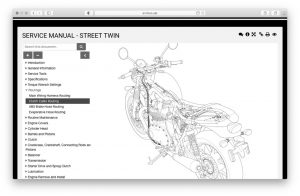 There’s also a section on diagnostics, but this includes software downloads that are available only to dealers, as they require Triumph’s diagnostic computer to both download and transfer the data to a motorcycle.
There’s also a section on diagnostics, but this includes software downloads that are available only to dealers, as they require Triumph’s diagnostic computer to both download and transfer the data to a motorcycle.
So, once I discovered I could save viewed sections, I proceeded to search for sections that were of interest to me and saved them. Without deliberately trying to save as many as I could within my time limit, I nonetheless managed to capture 113 sections (about a third of those available), some of which contain up to a dozen pages. I do not intend to share these saved files; they are copyright-protected, and the main reason Triumph does not want to sell copies of its manuals outright.
I estimate that with another hour of access, I can probably save the remaining manual to my computer. Despite my initial shock at Triumph’s prices for online access, the factory Street Twin manual proved to be about the best deal available.
Oh, regarding the brake fluid change, the procedure outlined in the Triumph manual requires using a Triumph diagnostic computer. While the Haynes manual doesn’t include the procedure, it does suggest using a thing called a DealerTool, which connects the bike to a computer and mimics a Triumph diagnostic computer. I’ve ordered one.









